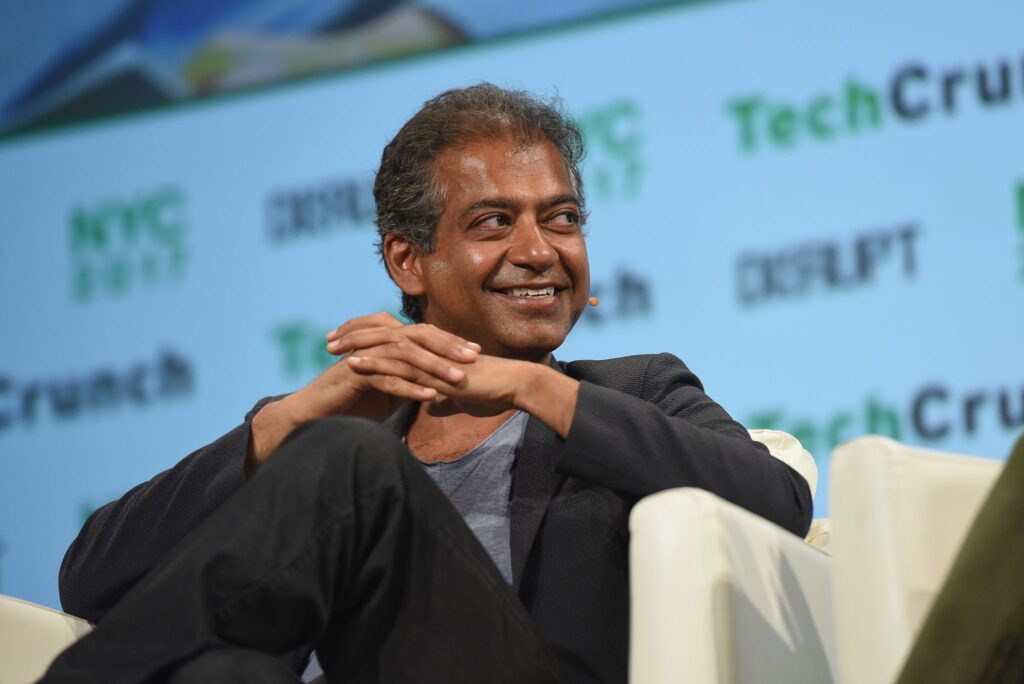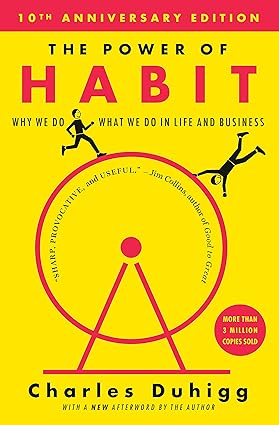
Table of Contents
Introduction
Naval Ravikant is a successful entrepreneur, investor, and philosopher. He is known for his unique perspectives on life, business, and spirituality. One thing that Naval often talks about is the importance of reading.
He believes that reading is one of the best ways to learn, to grow, and to expand one’s mind. In this article, we will look at 11 books that Naval Ravikant thinks everyone should read.
1. The Power of Habit: Why We Do What We Do in Life and Business by Charles Duhigg :

This book explores the science of habit formation and how we can use this knowledge to transform our lives. Naval has spoken highly of this book, stating that “it’s one of the most important books I’ve ever read”.
2. The Network State: How to Start a New Country by Balaji Srinivasan :

This book presents a bold vision for the future of governance and politics. It proposes a new model for building decentralized, digital nations that are based on networks rather than traditional hierarchies. Naval has praised this book as “an incredibly important piece of work”.
3. Superintelligence: Paths, Dangers, Strategies by Nick Bostrom :

This book explores the potential risks and benefits of creating super intelligent machines. It raises important questions about the future of AI and how we can ensure that it is aligned with human values. Naval has called this book “a must-read for anyone interested in the future of technology”.
4. How to Change Your Mind: What the New Science of Psychedelics Teaches Us About Consciousness, Dying, Addiction, Depression, and Transcendence by Michael Pollan :

This book examines the recent resurgence of research into psychedelic substances and their potential therapeutic uses. It provides a fascinating look at the history, science, and experiences of altered states of consciousness. Naval has recommended this book for anyone who wants to explore their own mind and consciousness.
5. Mastering the Core Teachings of the Buddha: An Unusually Hardcore Dharma Book by Daniel Ingram :

This book presents a no-nonsense approach to Buddhist practice and meditation. It emphasizes the importance of direct experience and insight in achieving enlightenment. Naval has praised this book as “one of the best books on meditation and spirituality”.
6. The Compleat Strategy: Being a Primer on the Theory of Games of Strategy by J. D. Williams :

This book provides an introduction to game theory and strategic thinking. It covers a wide range of topics, from decision theory to the prisoner’s dilemma. Naval has recommended this book for anyone who wants to improve their thinking and decision-making skills.
7. The Evolution of Cooperation by Robert Axelrod :

This book explores the phenomenon of cooperation and how it has evolved in different species. It uses game theory to explain how cooperation can emerge in situations where self-interest would seem to dictate otherwise. Naval has called this book “a classic in the field of game theory and cooperation”.
8. At Home in the Universe: The Search for the Laws of Self-Organization and Complexity by Stuart Kauffman :

This book presents a new theory of complexity and self-organization in living systems. It argues that life is a property of complex systems and that the universe is “inherently creative”. Naval has praised this book as “a deep and insightful exploration of the nature of life and the universe”.
9. Incerto Books in Order (5 Book Series) by Nassim Taleb :
Incerto is a series of 5 books written by Nassim Taleb, a former risk analyst and professor of mathematics, and covers a range of topics including philosophy, probability, and economics. Here, you can see them all in order! (plus the year each book was published)
I. Fooled by Randomness (2001) :

This book examines the role of luck and randomness in our lives and the importance of recognizing and navigating the unpredictable nature of the world.
II. The Black Swan (2007) :

This book explores the concept of rare and unpredictable events that have a significant impact on society, and how individuals and institutions can prepare for and respond to these events.
III. Antifragile: Things that Gain from Disorder (2012) :

This book argues that instead of simply being resilient or robust, individuals and systems should aim to be “antifragile” – that is, they should thrive and benefit from disorder, uncertainty, and stress.
IV. The Bed of Procreates (2010) :

This book is a collection of aphorisms and philosophical musings on a range of topics, including decision-making, ethics, and human nature.
V. Skin in the Game (2018) :

This book discusses the concept of “skin in the game” and why it is important for individuals and institutions to have a personal stake in the decisions they make, as well as the potential consequences of failing to do so.
10. Principles Life and Work by Ray Dalio :

Ray Dalio is the founder of Bridgewater Associates, one of the world’s largest hedge funds. In Principles, he shares the insights and principles that have guided his personal and professional life and the strategies he has used to achieve success.
The book covers topics such as decision-making, leadership, and company culture, and provides actionable advice for individuals and organizations looking to improve their performance and achieve their goals.
Dalio’s approach is rooted in his belief in “radical transparency” – that is, being open and honest about one’s strengths, weaknesses, and perspectives in order to make better decisions and build stronger relationships.
Principles have been praised for its practicality and accessibility and has become a widely-read and influential book in the world of business and self-improvement.
11. Sapiens: A Brief History of Humankind by Yuval Noah Harari :

In “Sapiens”, Yuval Noah Harari takes us on a journey through the history of humankind, from the emergence of Homo sapiens in Africa to the present day.
He explores how our species has managed to dominate the planet and the impact that we have had on the environment and other species. Naval Ravikant recommends this book because it provides a broader perspective on the history of our species and the challenges we face today.
Conclusion
In conclusion, the books recommended by Naval Ravikant cover a wide range of topics and disciplines, from psychology and neuroscience to economics and philosophy.
Each book provides unique insights and perspectives and can be valuable for anyone looking to expand their knowledge and understanding of the world. Whether you’re looking to improve your personal or professional life, or simply seeking new ideas and inspiration, these books are definitely worth checking out.
FAQs
1. Who is Naval Ravikant ?
Naval Ravikant is a successful entrepreneur, investor, and podcaster known for his insights on business, technology, and personal growth.
2. What is the book ‘The Power of Habit’ about ?
The Power of Habit by Charles Duhigg explores the science of habits and how they can be harnessed to improve our lives and businesses.
3. What is ‘Antifragile’ by Nassim Taleb about ?
Antifragile is a book by Nassim Taleb that argues for the importance of embracing disorder and uncertainty in order to thrive and succeed.
4. Who is Ray Dalio ?
Ray Dalio is the founder of Bridgewater Associates, one of the world’s largest hedge funds, and the author of Principles Life and Work.
5. Did Naval Ravikant recommend all these books ?
Not necessarily. This book list has Naval Ravikant must-read recommendations, but it also has a mix of mentions and suggestions.
6. How do you know Naval Ravikant mentioned these books ?
Every suggestion made by Naval Ravikant on the Public Forum is compiled by our editors. But if you see any error on our list, please let us know! We want it to be as accurate as possible.
7. Did Naval Ravikant actually create this list ?
No. Our editors curated this reading list based on mentions from Leaders on the Public forum.





107 Comments
Hi there! I now this is kinda off topic nevertheless I’d figured I’d ask.
Would you bbe interested in exchanging links or maybe guest authoring a blog article or vice-versa?
My blog addresses a lot of the same topics as yours and I
think we could greatly benefit from ach other. If you’re interested feel
free to send me an email. I look forward to hearing frkm you!
Fantastic blog by the way! http://boyarka-Inform.com
buy tiktok ads account https://buy-tiktok-ads.org
buy tiktok ads account tiktok ads account for sale
tiktok ad accounts https://tiktok-ads-agency-account.org
tiktok agency account for sale https://buy-tiktok-ads-accounts.org
tiktok ads agency account https://buy-tiktok-ad-account.org
tiktok ads account for sale https://tiktok-agency-account-for-sale.org
tiktok ads account for sale https://tiktok-ads-account-for-sale.org
buy tiktok ad account https://tiktok-ads-account-buy.org
tiktok ads account for sale https://buy-tiktok-ads-account.org
buy business manager account buy verified bm
facebook verified business manager for sale verified-business-manager-for-sale.org
buy facebook business managers buy-bm.org
verified bm buy-business-manager-verified.org
buy facebook business manager https://business-manager-for-sale.org
buy business manager facebook https://buy-verified-business-manager.org
buy business manager https://buy-verified-business-manager-account.org/
facebook bm for sale https://buy-bm-account.org/
buy google adwords account https://buy-verified-ads-account.work
facebook bm buy buy verified facebook business manager
buy google ad account https://ads-agency-account-buy.click
old google ads account for sale https://sell-ads-account.click
buy verified google ads account https://buy-ads-agency-account.top
google ads reseller https://buy-account-ads.work
buy google ad account https://buy-ads-invoice-account.top
google ads agency accounts https://ads-account-buy.work
buy google ad threshold account ads-account-for-sale.top
facebook account buy https://buy-accounts.click/
google ads accounts buy aged google ads accounts
buy aged google ads account google ads account buy
fb account for sale https://ad-accounts-for-sale.work
cheap facebook advertising account https://buy-ad-account.click
Эта публикация завернет вас в вихрь увлекательного контента, сбрасывая стереотипы и открывая двери к новым идеям. Каждый абзац станет для вас открытием, полным ярких примеров и впечатляющих достижений. Подготовьтесь быть вовлеченными и удивленными каждый раз, когда продолжите читать.
Получить дополнительные сведения – https://medalkoblog.ru/
facebook ad account buy https://ad-account-for-sale.top
buy facebook account for ads buying facebook account
buy aged fb account https://ad-account-buy.top/
buy facebook accounts buy account facebook ads
buy facebook profile https://buy-ad-account.top
buy aged facebook ads account https://buy-ad-accounts.click
buy facebook ad account https://buy-adsaccounts.work
площадка для продажи аккаунтов https://kupit-akkaunt.online/
купить аккаунт купить аккаунт
маркетплейс аккаунтов online-akkaunty-magazin.xyz
площадка для продажи аккаунтов akkaunty-optom.live
продажа аккаунтов kupit-akkaunty-market.xyz
продажа аккаунтов магазины аккаунтов
продать аккаунт akkaunt-magazin.online
маркетплейс аккаунтов kupit-akkaunt.xyz
купить аккаунт rynok-akkauntov.top
маркетплейс аккаунтов соцсетей https://akkaunty-na-prodazhu.pro/
account trading service https://accounts-marketplace-best.pro/
account market account marketplace
verified accounts for sale https://social-accounts-marketplace.live
buy account https://buy-accounts.live
accounts market https://buy-accounts-shop.pro
buy accounts https://buy-accounts.space
account marketplace https://social-accounts-marketplace.xyz/
account selling platform https://accounts-marketplace.live
account market accounts marketplace
account market buy-best-accounts.org
gaming account marketplace https://accounts-marketplace.xyz/
secure account purchasing platform account market
account sale purchase ready-made accounts
account store website for selling accounts
account store accounts-buy-now.org
marketplace for ready-made accounts secure account purchasing platform
website for buying accounts profitable account sales
secure account sales account market
account marketplace account selling platform
account trading guaranteed accounts
buy pre-made account guaranteed accounts
account acquisition secure account purchasing platform
purchase ready-made accounts account market
account store find accounts for sale
database of accounts for sale https://buy-social-accounts.org/
marketplace for ready-made accounts account exchange
marketplace for ready-made accounts website for selling accounts
secure account purchasing platform https://accounts-buy.org/
sell account account catalog
guaranteed accounts database of accounts for sale
profitable account sales accounts-marketplace.org
website for selling accounts sell pre-made account
website for buying accounts account trading platform
accounts marketplace guaranteed accounts
sell account ready-made accounts for sale
secure account sales account marketplace
buy pre-made account website for selling accounts
sell account buy and sell accounts
account buying service profitable account sales
account acquisition https://bestaccountsstore.com
Account Catalog Ready-Made Accounts for Sale
Account Trading Website for Buying Accounts
Online Account Store Account Trading
Buy Pre-made Account Accounts for Sale
Account Purchase Account marketplace
Account Trading Sell Pre-made Account
Account Catalog Secure Account Purchasing Platform
Account Catalog Account Buying Platform
Account Trading Platform Account Buying Platform
Buy Pre-made Account Account exchange
услуги по продаже аккаунтов безопасная сделка аккаунтов
платформа для покупки аккаунтов магазин аккаунтов
магазин аккаунтов маркетплейс аккаунтов соцсетей
аккаунты с балансом перепродажа аккаунтов
продажа аккаунтов соцсетей магазин аккаунтов
продажа аккаунтов соцсетей платформа для покупки аккаунтов
безопасная сделка аккаунтов https://birzha-akkauntov-online.ru/